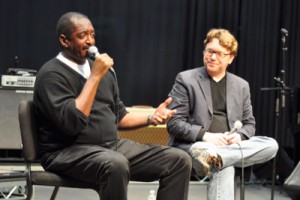Beyoncé’s father shares experiences
The process of becoming a famous musician is a complex one, but the best way to learn is to hear it from someone who has been there.
On Friday, music executive Matthew Knowles, best known as the manager and father of pop sensations Beyoncé and Solange Knowles, and the founder, CEO and president of Music World Entertainment, delivered a lecture to Thornton School of Music’s Popular Music Forum class.

True passion · During a talk with USC professor Christopher Sampson, Matthew Knowles stressed the importance of being involved in the music world simply for the love of the musical art, not for the money. - Emily Tat | Daily Trojan
The talk was hosted at the Carson Sound Stage and Professor Christopher Sampson mediated the lecture, prompting Matthew Knowles with a number of questions that canvassed everything from his personal taste in music to the state of the modern music industry and his advice for the students in the class.
In the end, he stressed passion, preparedness, teamwork, thinking outside the box and not being afraid of failure as the cornerstones for successful musical artists.
As Matthew Knowles discussed his life before his initial involvement in the music industry, it was clear that he was a product of his own advice.
A graduate of Fisk University, Matthew Knowles spent many years working for Xerox, where he earned a six-figure salary.
But after Girl’s Tyme, the singing group Beyoncé was a part of, lost on Star Search, Matthew Knowles recognized the group’s ability to succeed and became more involved with it.
“For some reason, the ones that lose on Star Search rededicate, change their organization and they go on to be successful,” he said.
Girl’s Tyme was signed to Elektra Records, but was dropped before releasing an album.
What followed was a series of changes, including a lineup and the final name change to Destiny’s Child.
“That was the defining moment, when they were dropped by Elektra,” he said. “I quit my job and everyone thought I was nuts.”
Destiny’s Child signed to Columbia Records and went on to become an immensely popular group, selling more than 40 million records worldwide.
In addition to Destiny’s Child, Matthew Knowles was involved with the solo projects of the individual members as well as the career of his second daughter, Solange, who sings, acts, models and writes songs.
There were professional challenges, however that Matthew Knowles had to face. He was met with skepticism when he wanted to put a remix of the single “No, No, No” on the group’s self-titled debut.
But he argues how successful this would prove and it ultimately paid off, with the song staying at the top of the charts for weeks.
“You have to be a leader,” he said. “You have to think differently about your approach and people are going to say ‘that makes no sense whatsoever.’ People are going to laugh at your ideas, but that’s what it takes to be a visionary.”
When speaking about today’s music industry, Matthew Knowles noted how things have changed, and not always for the better.
“This business is declining,” Knowles said. “CD sales declined 19 percent from 2009 to 2010.”
In addition, digital sales are not the success everyone believes them to be.
“We made less than a 1 percent increase, 0.6 percent, in digital single sales last year,” he said. “So we have to think of different ways to approach the music industry. We look at those six ways that artists can monetize: branding, endorsement, licensing, sponsorships, touring and songwriting.”
He stressed that CD sales bring in the smallest portion of income for artists today.
Matthew Knowles also said that it takes considerable time to make a significant amount of money in the industry.
“For new artists, there won’t be a monetary aspect,” he said. “It takes about seven years from the time you sign a contract for you to start making money in the music industry.”
But he added that for those who are truly passionate about music, money is not the primary concern.
“I’ve had failures and successes that I want to share with young people,” he said. “I’m very passionate about [the] music industry, and the thought was never ‘how much money am I going to make?’ It can never be for the money. It has to be because you love it.”
When questioned about the future of the music industry, Matthew Knowles asked students to stand up and identify themselves as what they were or aspired to be: singers, songwriters, musicians, producers, managers and so on.
“The answer is really the people in the room,” he said.
He argued that the rise of social networking has increased the number of possibilities for artists. Now, young artists don’t need managers to get noticed.
“You don’t have to be great to get started,” he said. “But you have to start to become great. Let that be your lesson as new artists, and just get started.”
Ultimately, Matthew Knowles gave the class an honest look into the music business and imparted advice from one music lover to a room full of them. He encouraged aspiring artists to take risks and make sure their passion reflects upon their work.
“You must be prepared to be great,” he said. “If you don’t believe it, nobody else is going to believe it.”
